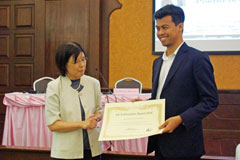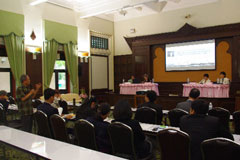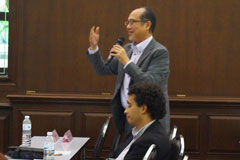JICA-RI Presents Results of the Human Security in Practice: East Asian Experiences Research Project at Surin Pitsuwan Memorial Symposium
2019.02.27
The JICA Research Institute (JICA-RI) and Chulalongkorn University Social Research Institute (CUSRI) jointly hosted a symposium on the “Diversity of Human Security Practice in Southeast Asia” on Dec. 11, 2018, in Bangkok, Thailand. The symposium was held in memory of Surin Pitsuwan, who made great efforts toward the promotion of human security in the ASEAN region.
At the symposium, JICA-RI researchers presented the findings of the book “Human Security Norms in East Asia,” which is an outcome of JICA-RI’s “Human Security in Practice: East Asian Experiences” research project. The book is dedicated to the late Surin Pitsuwan, who contributed to this project as a distinguished fellow at JICA-RI. During his lifetime, Surin Pitsuwan served as Thai foreign minister and ASEAN secretary-general.
The research commenced in 2013, involving 36 researchers and practitioners from East Asian countries. The objective was to shed light on how the concept of human security is understood and implemented in the East Asian countries of Indonesia, Cambodia, Malaysia, Myanmar, the Philippines, Singapore, Thailand, Vietnam, Japan, China and South Korea.
At the beginning of the symposium, Katsura Miyazaki, chief representative at the JICA Thailand Office, presented the opening remarks, and JICA Vice President and JICA-RI Principal Research Fellow Nobuko Kayashima announced that the late Surin Pitsuwan had been awarded with the 14th JICA President Award, and a certificate of merit was presented to his son. Carolina G. Hernandez, professor emeritus of Political Science at the University of the Philippines (Diliman), the Philippines, gave the keynote address titled “Human Security and Memories of the late Dr. Surin.” In the keynote address, she mentioned about how the understanding of the concept of human security had deepened and progressed, honoring the achievements of Surin Pitsuwan and his commitment to the spread of the human security concept in the ASEAN region.

JICA-RI Principal Research Fellow Nobuko Kayashima (left) is handing over a certificate of merit to a son of the late Surin Pitsuwan
This was followed by a presentation of the research outline and the content of the book mentioned above. The presenters were Yoichi Mine, a visiting fellow at JICA-RI and a professor at the Graduate School of Global Studies, Doshisha University, Japan, and Oscar A. Gómez, a former research fellow at JICA-RI and an assistant professor at Ritsumeikan Asia Pacific University, Japan.
Firstly, Mine said that the research was composed of two phases – Theory and Practice. This book is the outcome of the research focused on the Theory phase. He explained that, while emphasizing the importance of the comprehensive understanding of human security, the book zeroed in on how the concept is taking root in various countries and how it is being understood. He pointed out that while state security is expected to contribute to human security, civil society also has an important role to play.
In his presentation, Gómez described how the research focused on the process of localizing the concept of human security in each of the countries of the region. He explained that there are several stages in that localization. The first is “prelocalization,” when local actors resist and contest new norms on the grounds of existing beliefs and practices. This is followed by the stage in which local initiative begins to develop, the stage in which adaptation takes place in accordance with local circumstances, and the “amplification” stage in which the concept spreads. From the localizing experience in the region, he pointed out four tendencies: 1) Achieving human security is seen as the reason of the state or raison d’état; 2) Some form of paternalism, i.e., reliance on the state for protection, exists and is positively embraced, mainly in relation to the importance of safety nets, and welfare policies; 3) A paradoxical understanding of empowerment transpired from the research, as the state was seen as in charge of empowering people, to the point that strengthening the state was part of it; 4) There are insecurities linked to both the lack of development and development aggression—for example, poverty-stricken areas affected by pollution—resulting on dilemmas about how to deal with them.
JICA-RI Senior Research Fellow Ako Muto introduced the Policy Note No.3 “Revisiting Human Security: Recommendations from a Research Project Targeting Eleven East Asian Countries,” by JICA-RI and JICA’s Operations Strategy Department, and explained the importance of its three recommendations: “shifting from protection by the government to empowerment of the people,” “promoting horizontal collaboration,” and “sovereignty and mutual trust.”
A roundtable discussion titled “The prospects of Human Security in Southeast Asia” was then held, with Muto serving as moderator. Kayashima and Sachiko Ishikawa, senior advisor on Peacebuilding and South-South Cooperation for JICA took the rostrum. Discussions were held with the participation of Amara Pongsapich, who is professor emeritus at the Faculty of Political Science, Chulalongkorn University, and CUSRI Deputy Director Surangrut Jumnianpol. Kayashima underlined that human security is the foundation for all JICA projects, along with high-quality growth. Additionally, she introduced JICA initiatives related to human security, such as disaster risk reduction in Indonesia and the consolidation of peace in Mindanao in the Philippines. Ishikawa focused on the evolution of the “Responsibility to Protect” (R2P) concept in the ASEAN region. She emphasized the late Surin Pitsuwan’s achievement in boosting the recognition of the term “people-centric.”
Various issues were raised through the discussions that included the participation of the audience. They included the human rights of migrant workers and the pursuit of a humane society that is free of national boundaries, the implementation of comprehensive human security that focuses on people at a regional level, and an analysis of the relation between Sustainable Development Goals (SDGs) and human security.

Audience members participate in a lively discussion with panelists

JICA-RI Visiting Fellow Yoichi Mine (standing in the back) makes a comment
CUSRI Director Prapart Pintobtang closed the symposium by reiterating the importance of further collaboration between JICA and Chulalongkorn University in the field of human security and the SDGs, and paid homage to the memory of Surin Pitsuwan. JICA-RI will review the direction of further research based on such input.

事業事前評価表(地球規模課題対応国際科学技術協力(SATREPS)).国際協力機構 地球環境部 . 防災第一チーム. 1.案件名.国 名: フィリピン共和国.

事業事前評価表(地球規模課題対応国際科学技術協力(SATREPS)).国際協力機構 地球環境部 . 防災第一チーム. 1.案件名.国 名: フィリピン共和国.

事業事前評価表(地球規模課題対応国際科学技術協力(SATREPS)).国際協力機構 地球環境部 . 防災第一チーム. 1.案件名.国 名: フィリピン共和国.

事業事前評価表(地球規模課題対応国際科学技術協力(SATREPS)).国際協力機構 地球環境部 . 防災第一チーム. 1.案件名.国 名: フィリピン共和国.

事業事前評価表(地球規模課題対応国際科学技術協力(SATREPS)).国際協力機構 地球環境部 . 防災第一チーム. 1.案件名.国 名: フィリピン共和国.
scroll